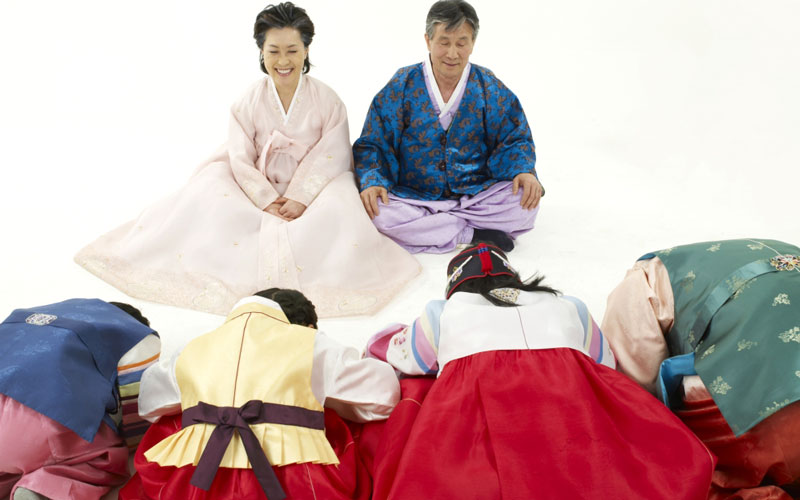- 한국어
- English
- 日本語
- 中文
- العربية
- Español
- Français
- Deutsch
- Pусский
- Tiếng Việt
- Indonesian
By Honorary Reporter Alle Blessing Ovase from Nigeria.

A Nigerian boy prostrates and his sister kneels in greeting their mother. (Alle Blessing Ovase )
Due to the advent of Western civilization however, respect can be seen as a dying element of culture. Despite this, I have experienced two cultures that still hold respect in high esteem. To Africans, respect is deeply rooted in all aspects of their culture and tradition and ought to be used for the people, the land and animals. Through my study, I realize that the same applies to Korean culture. In this article, I will compare the respect system of the Yorubas of western Nigeria with that of Koreans.
Respect is an important aspect of Yoruba tradition and a symbol of both peace and order. The manner of greeting is one of the first things a stranger notices about the Yoruba system of respect. A male is expected to greet an older person with a bow or prostration and a female with a kneel. Respect is also shown by putting one's arms behind his or her back when talking to adults, though the age difference between people and their upbringing also play a role. Another important aspect of respect in Yoruba culture is in their manners of greeting and talking not only between people older and younger but also among peers.
In Yoruba conversations, the manner in which pronouns are used reflects respect. Unlike the English language where "you" is used regardless of age, the Yoruba language requires pronunciation of the "e" like in "egg" when speaking to someone older, and this is also used with two or more people or visitors irrespective of age. The sound "o" as pronounced in "OK" is used to address a friend of the same age. And when calling someone by name, a title like sister, aunt, brother or uncle precedes the person's name as a sign of respect.

(iclickart)
In Korea, respect for others based on seniority is a pillar of the nation's Confucian tradition. Seniority is based on age, position in the family or a job like a teacher. Respect is deeply imbedded into every fiber of the Korean way of life like manner of speaking, greeting, eating, drinking and even how one smokes a cigarette. Korean uses an extensive system of honorifics to reflect the speaker's relationship to the subject of a sentence and speech levels to reflect the speaker's relationship to the audience. For example, gratitude to a friend or a relative can be expressed by saying "Gomawoyo" but to someone older or in a formal situation, the proper expression is "Gamsahamnida" or "Daedanhee gamsahamnida."
When drinking with an older person in Korea, it is customary to turn one's head away from an older person when drinking as a sign of respect. Koreans believe that direct eye contact during conversations shows boldness and is thus disrespectful. So out of respect and politeness, Koreans concentrate on chatting while avoiding eye contact.
The bow is the traditional Korean greeting, though often accompanied by a handshake among men. To show respect when shaking hands, men put their left hand in the crook of their right arm. Women usually slightly nod as a sign of greeting. Bowing is the proper way of saying goodbye to older people while waving is fine to younger people.
If an older person passes by a someone who is smoking, the latter is expected to put out his or her cigarette or hide it. When accepting something from an older person, the recipient is expected to receive it with both hands and bow. If the item is small enough to be received with one hand, the recipient is expected to use one hand to take it and place his or her other hand under the forearm or the lower chest for support.
Respect is an integral part of both Korean and Yoruba cultures and incorporated into everyday manners of speech, eating, greeting, drinking and even smoking. Both cultures hold respect in high esteem, and to them, respect is not just a tradition passed down through generations but a way of life.
chaey0726@korea.kr
*This article is written by a Korea.net Honorary Reporter. Our group of Honorary Reporters are from all around the world, and they share with Korea.net their love and passion for all things Korean.